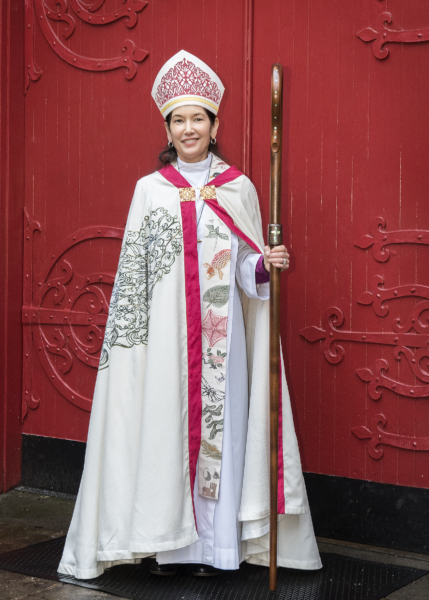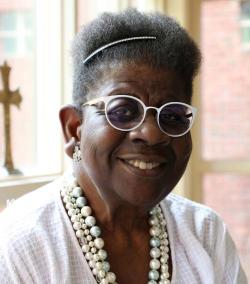Absalom Jones Center’s ‘Women of Distinction’ honorees bring grace, grit to the churchPosted Mar 17, 2022 |
|

The Rev. Nancy Frausto, a “Dreamer” and then deputy from the Diocese of Los Angeles, testified July 7, 2018, testified on immigration resolutions during the 79th General Convention. She is now director of Latinx Studies at the Seminary of the Southwest in Austin, Texas. Photo: David Paulsen/Episcopal News Service
[Episcopal News Service] For the Rev. Nancy Frausto’s students at the Seminary of the Southwest in Austin a trip to the Texas-Mexico border is a standard part of the curriculum.
“We go, so they can learn about border ministry and immigrants firsthand,” said Frausto, 37, the seminary’s director of Latinx Studies.
Born in Mexico, Frausto crossed the border with her parents at 7 and grew up in Los Angeles. She is the first and only Episcopal priest to have benefited from the federal Deferred Action for Childhood Arrivals program. Her ministry and student instruction focus on pastoral care and healing racial trauma.
“Part of my healing has been to come to terms with trauma and not be held captive by it,” Frausto told Episcopal News Service. “It is important to acknowledge trauma, whether you’re a first- or fourth-generation Latino in this country. It’s okay to let go and heal without feeling guilt for the sacrifice that was made by our parents. This is a message of hope.”
Frausto is one of five “Women of Distinction,” being honored by the Absalom Jones Center for Racial Healing during Women’s History Month. Each week throughout March the Atlanta-based center will highlight a woman, chosen for “grace, grit and a courageous commitment to dismantling racism and advocating for wellness,” on its website, according to Catherine Meeks, executive director.

Oregon Bishop Diana Akiyama stands in front of a red chapel door at Trinity Episcopal Cathedral in her vestments, holding her crozier. Photo: Danny Lennox Bronson
Although Oregon Bishop Diana Akiyama is the first Japanese-American woman ordained a priest and the first Asian American woman bishop in The Episcopal Church, she never set out to be “first” at anything, she said in an email to ENS.
Yet, she considers the designation—as well as the center’s recognition—both an honor and a responsibility.
The challenge of being first, said Akiyama, whose Aug. 29, 2020, election, was the first all-online election in the church, “is to continue to focus on the spirit that led us to this place and this work.
“There are many opportunities to be distracted by the manner in which others may struggle with the practical reality of my being an Asian American woman bishop,” she said.“In the end, my vocation is, and has always been, shaped by all that I am and all that I bring. I have always understood my journey to be in its fullest form of expression when I am firmly grounded in my embodied truth.”
U.S. Secretary of the Interior Deb Haaland is featured this week. She is a member of the Pueblo of Laguna, a 35th generation New Mexican. The center honored Haaland as a woman of distinction, “because she is the first Indigenous woman to ever hold a cabinet-level position in this country,” Meeks said. “We are committed to trying to do all the things we can do at the center to help lift up Indigenous people, as well as African Americans, Latinx and Asian Americans and Pacific Islanders.”
Other honorees include the Very Rev. Cynthia Kittredge, dean of the Seminary of the Southwest in Austin, Texas; and Meeks, herself.

The Very Rev. Cynthia Briggs Kittredge is dean and president of Seminary of the Southwest in Austin, Texas.
Kittredge’s “phenomenal work around racial healing,” involves transitioning the 70-year-old seminary from predominantly white to a more diverse institution, through recruitment of more students and faculty of color, Meeks said.
“We believe that, with a more diverse community, a community that appreciates different ways of knowing, and bringing different experiences, that all our students will be more effective ministers of the Gospel, more culturally competent and more able to connect and preach Christ’s good news,” Kittredge said.
Hiring Frausto to lead Latinx Studies, “is just one example of the amazing grace we’ve been given,” she added. “Through her presence, she has attracted other students, and motivated and inspired the students we have.”
Meeks, a longtime educator whose work in racial healing led to the creation of the center in 2017, has been named a 2022 President Joseph R. Biden Lifetime Achievement honoree. The award honors individuals who exhibit outstanding character, work ethic and dedication to their communities.

Catherine Meeks is the founding executive director of the Absalom Jones Episcopal Center for Racial Healing in Atlanta, Georgia.
Increasingly, Meeks, 76, a retired professor of socio-cultural studies, is focused on youth. “We are located across the street from the Atlanta University Consortium; there’s 6,000 young people on that campus and we’re getting more and more involved with trying to bring them into what we’re doing,” she said.
The center has piloted dismantling racism curriculums for kindergarten through 12th grade, in the hopes that, “we can teach people that everybody is God’s beloved child. And that we’re all trying to be human here, we just need to learn how to live on this planet together,” she said.
Meeks consults with dioceses, congregations, and seminaries on issues of diversity, has authored six books, edited another, “Living into God’s Dream: Dismantling Racism in America,” and co-authored “Passionate for Justice: Ida B. Wells as Prophet for our Times.”
Honoring women in this way, “shines a light on new and different forms of courageous engagement with what it means to be a leader in the church in these times,” Akiyama said. “We are in extremely turbulent times and the work of a successful leader … will be to anchor oneself in a vision of transformation and wholeness. Many of the women leading the church today recognize the need for gentle courage and razor-sharp clarity to cooperate with the movement of the Holy Spirit.”
Both Akiyama and Frausto said healing racial wounds can be slow but is crucial to the future of the church and the country.
“Throughout the church and the country, as we talk more about what racial reconciliation looks like, we have to talk about the hurt that exists and acknowledge it,” Frausto said. Her DACA status, memories of crossing the border as a child and living in the shadows, are part of the grit and grace she brings to her students, she said. “I bring my personal story, along with the stories in academic books, to say, this is the face of immigration in this country so, as religious leaders, how do we pastor in these situations?”
Issues of power, identity, race and privilege are also a part of the curriculum, she said. “If you are a white individual, how does that power and privilege show up? And how do you use that for the work of God in ministry and for those people of color who feel they have no power?”
Curiosity and willingness to be uncomfortable are key components of engaging the racial reconciliation that needs to be undertaken by all educational institutions and churches “because this is work that the church needs, that the world needs and we are called to make sure we are working towards a beloved community,” she said.
Akiyama said pandemic-related anti-Asian Pacific Islander attacks “are alarming because it was not that long ago that my own family was incarcerated for being Japanese Americans living on the west coast of the U.S.“Racial violence stems from fear of the other. We must remember that Jesus was very much the “other” The power of healing and reconciliation generated from those at the margins might very well be what saves us,” she said.
–The Rev. Pat McCaughan is a correspondent for the Episcopal News Service, based in Los Angeles.

Social Menu